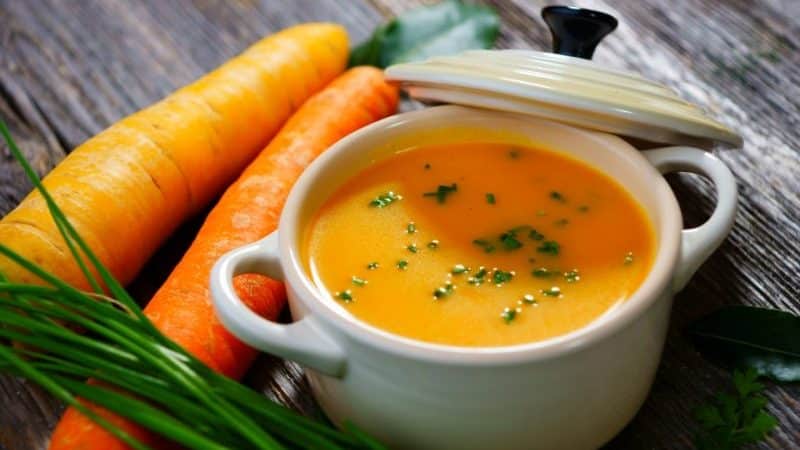How to eat carrots for various forms of gastritis
For diseases of the gastrointestinal tract, including gastritis, a special diet is indicated. Nutrition should be moderate and balanced; some foods are strictly prohibited.
Some products are used as medicinal products. Among them, one of the first places is occupied by carrots - its consumption relieves symptoms illnesses. For gastrointestinal diseases, carrots are used raw and boiled; carrot juice is also consumed.
Is it possible to eat carrots with gastritis?
Contains carrots contains dozens of vitamins and microelements: vitamins A, B, C, iron, magnesium, fluorine, iodine, phosphorus, manganese. Its main advantage is its high beta-carotene content. The vegetable destroys the breeding ground for Helicobacter pylori bacteria, so its consumption is recommended for all forms of gastritis.
Attention! You are allowed to eat no more than 300 g of carrots per day.
How carrots work for different forms of gastritis
Gastritis is a complex disease, and with its different forms, the effect of carrots will also be different. The method of consuming the vegetable depends on the form of the disease.
With high acidity
The fresh product increases the concentration of acid, so it should not be taken by patients with gastritis with high acidity. In this case, boiled carrots will be useful. A heat-treated product is better absorbed by the body. His prepare as an independent dish and added to other products.Freshly squeezed carrot juice is also contraindicated if you have high stomach acidity.
Advice. To preserve the healing properties of carrots while cooking, cook them in a saucepan with the lid closed.
For erosive
Erosive gastritis is manifested by inflammation of the gastric mucosa, in which small wounds (erosions) form on its surface.
With this form of the disease, the product is consumed only in boiled form. Carrot juice can be taken for preventive purposes when the stage of exacerbation of the disease has passed. The juice also serves as an excellent immune stimulant.
Useful properties of carrots for gastritis
In any form of the disease, carrots have a positive effect on the gastrointestinal tract:
- beta-carotene in the vegetable acts as a powerful antioxidant, it protects the walls of the stomach from the formation of ulcers;
- thanks to the antispasmodic effect, the vegetable reduces pain;
- destroys the breeding ground for bacteria in the stomach;
- has a mild laxative property, which helps cleanse the intestines;
- strengthens the walls of blood vessels;
- regulates metabolism in the body;
- enriches the body with vitamins.
How carrots affect acidity
Carrots and carrot juice are added to the diet for gastritis, taking into account the acidity of the stomach.
Increases or decreases
Fresh vegetables stimulate the production of acidic secretions, therefore, in case of high acidity, they are added to food only after heat treatment. During the remission stage, it is allowed to add fresh root vegetables and juice to the diet in small quantities.
For gastritis with low acidity, it is recommended to consume fresh carrots and freshly squeezed juice.
Important! Drink fresh carrot juice no later than 30 minutes after preparation, as it quickly loses its beneficial properties.
What is in carrots that can be harmful to the stomach?
Excessive consumption of carrots for stomach diseases can cause unpleasant symptoms:
- the coarse fiber in the product is difficult to digest, which can lead to pain and bloating;
- an excess of microelements often causes metabolic disorders;
- Beta-carotene when consumed in excess of carrots can cause allergic reactions and yellowing of the skin.
Features of eating carrots for gastritis
Despite the fact that patients with gastritis exclude many foods from the diet, the menu can be made tasty and healthy. Carrots will help with this.
Fresh

Before including a fresh vegetable in your diet, determine the acidity level.
With a reduced acidity level, carrots will help normalize the digestion process. It is grated or cooked from it salads.
The product will be better absorbed by adding sour cream or olive oil.
Attention! It is not recommended to eat fresh carrots on an empty stomach.
Carrot salad with sour cream
It will take no more than 5 minutes to prepare the salad. For two carrots you will need 2 tbsp. l. sour cream, 2 tsp. sugar and a pinch of salt.
Wash the carrots, peel and grate on a fine or coarse grater. Add sugar and salt and stir. Add sour cream, stir again until smooth.
Carrot and parsley salad
Take 300 g carrots, 100 g parsley roots, 1 tsp. parsley, 50 g vegetable oil, pinch of salt, 1 tsp. Sahara. Grate carrots and parsley roots on a fine grater, add salt, sugar, butter. Mix.
Boiled

Boiled carrots can be eaten for any type of gastritis. Nutritionists say that after heat treatment, the vegetable is absorbed faster and better.
When cooked, the product does not affect the acidity level. It will be equally useful both as a separate dish and as an ingredient in salads, meat and fish dishes, and soups.
Carrot soup
We prepare the soup from:
- carrots – 400 g;
- onion – 1 pc.;
- cream – 100 ml;
- chicken broth – 500 ml;
- flour – 1 tsp;
- butter – 40 g;
- water – 1 l;
- salt – 1 tsp;
- greens to taste.
Cut the root vegetables into cubes, add salt and water and cook for 25 minutes. Chop the onion and lightly fry for 3-5 minutes in butter, add flour, stir. Drain the water from the pan with boiled carrots and beat the carrots in a blender until the consistency of puree. Add fried onions with flour, chicken broth and cook for 5-7 minutes. Add cream and herbs to the pan and cook over low heat for another 3 minutes.

carrot juice
Juice It is allowed to use only with low acidity. For patients with erosive gastritis and high acidity, the drink is contraindicated; a small amount of fresh juice is allowed during the period of remission. You can prepare two types of carrot juice - freshly squeezed (fresh) and canned (boiled).
Fresh
To get 1 liter of fresh juice, you will need 1.5-2 kg of carrots. Root vegetables must be washed, peeled, chopped and squeezed out the juice in a squeezer. If it turns out too thick, strain it from the cake through several layers of gauze or dilute it with water. You can add a little sour cream or vegetable oil to the drink to better absorb carotene.
Canned juice

For 1 kg of carrots you will need 50-100 g of sugar. Squeeze the juice through a juicer and let sit for 20 minutes to allow a sediment to form. Next, carefully drain the juice and strain through 2-3 layers of gauze. Pour the resulting juice into an enamel bowl and cook over medium heat.
Heat the juice to a temperature of 80-85°C, but do not bring to a boil. Then add sugar, stir and remove the container from the burner. The boiled juice should be immediately poured into dry jars almost to the brim, so that there is no more than 1 cm from the surface of the juice to the edge of the jar.
Place the jars in a pan filled with water so that it reaches the middle of the jars. Place the pan over medium heat, and after the water boils, sterilize for 30 minutes.
Seal the jars with lids and place them upside down under a warm blanket until they cool completely. With gastritis, the stomach does not absorb nutrients and vitamins well, so carrot drink is indispensable as a source of vitamin A, which is necessary for the restoration of the body.
Attention! Even during remission, use canned juice with caution. It is better to dilute it with boiled water in the ratio: 2 parts juice to 1 part water.
For an adult, the maximum drink per day is two glasses.
For gastritis, juice is taken 30 minutes before meals and the total amount is divided into several doses.
Harm and contraindications
In some cases, carrots can harm the body.
Excessive consumption of this vegetable causes nausea, fatigue, headaches, and changes in skin color. Excess beta-carotene disrupts liver function.
Many people report heartburn and stomach discomfort after eating carrots on an empty stomach.
In what cases is it strictly forbidden to eat carrots?
Carrots are contraindicated for a number of diseases:
- stomach ulcer in the acute stage;
- acute pancreatitis;
- acute gastritis with high acidity;
- liver diseases;
- inflammatory bowel diseases;
- allergic reactions.
Carrots for the prevention of gastritis
For prevention purposes, nutritionists advise eating 2-3 medium carrots a day, adding sour cream, yogurt or cream to them.
As for the juice, it is recommended to drink it in courses of 25-30 days, up to three times a day before meals. The maximum volume should not exceed 200 ml. It is not recommended to increase the portion.
Conclusion
Carrots are a tasty, healthy and nutritious product. For diseases of the gastrointestinal tract, its healing properties help the body cope with the disease more quickly. How beneficial or harmful it will be depends on the amount consumed. In the right dosages, the vegetable will become a medicine, and if consumed in excess it will lead to unwanted side effects.